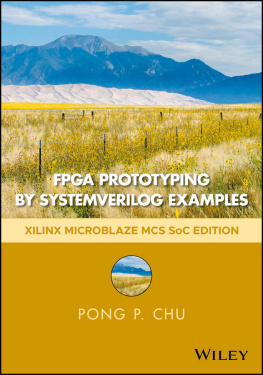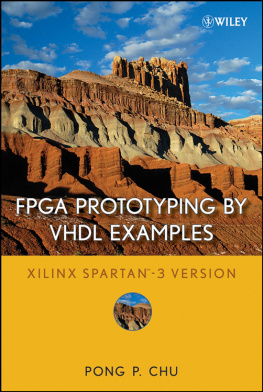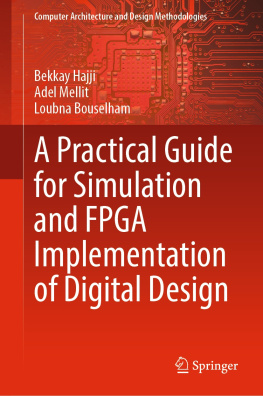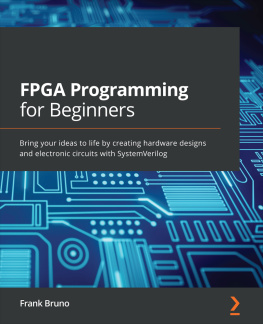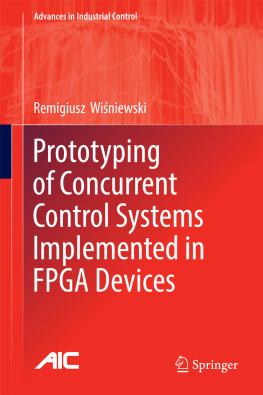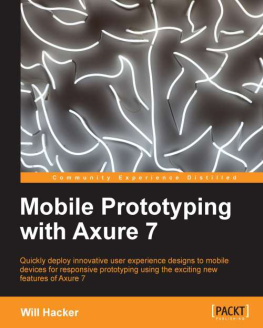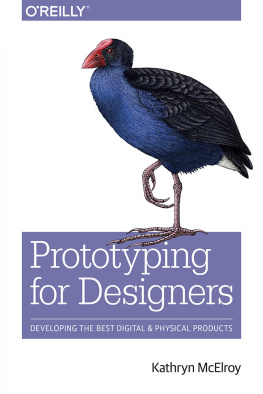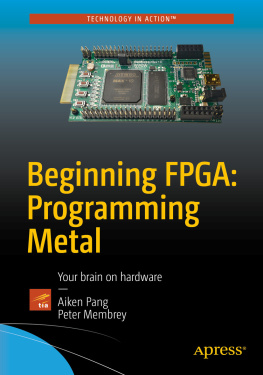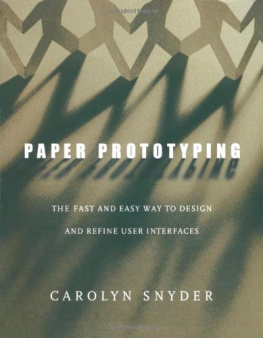Chu - FPGA Prototyping by Systemverilog Examples
Here you can read online Chu - FPGA Prototyping by Systemverilog Examples full text of the book (entire story) in english for free. Download pdf and epub, get meaning, cover and reviews about this ebook. year: 2018, publisher: Wiley, genre: Home and family. Description of the work, (preface) as well as reviews are available. Best literature library LitArk.com created for fans of good reading and offers a wide selection of genres:
Romance novel
Science fiction
Adventure
Detective
Science
History
Home and family
Prose
Art
Politics
Computer
Non-fiction
Religion
Business
Children
Humor
Choose a favorite category and find really read worthwhile books. Enjoy immersion in the world of imagination, feel the emotions of the characters or learn something new for yourself, make an fascinating discovery.
- Book:FPGA Prototyping by Systemverilog Examples
- Author:
- Publisher:Wiley
- Genre:
- Year:2018
- Rating:5 / 5
- Favourites:Add to favourites
- Your mark:
- 100
- 1
- 2
- 3
- 4
- 5
FPGA Prototyping by Systemverilog Examples: summary, description and annotation
We offer to read an annotation, description, summary or preface (depends on what the author of the book "FPGA Prototyping by Systemverilog Examples" wrote himself). If you haven't found the necessary information about the book — write in the comments, we will try to find it.
FPGA Prototyping by Systemverilog Examples — read online for free the complete book (whole text) full work
Below is the text of the book, divided by pages. System saving the place of the last page read, allows you to conveniently read the book "FPGA Prototyping by Systemverilog Examples" online for free, without having to search again every time where you left off. Put a bookmark, and you can go to the page where you finished reading at any time.
Font size:
Interval:
Bookmark:
Pong P. Chu
Cleveland State University

This edition first published 2018
2018 John Wiley & Sons, Inc.
All rights reserved. No part of this publication may be reproduced, stored in a retrieval system, or transmitted, in any form or by any means, electronic, mechanical, photocopying, recording or otherwise, except as permitted by law. Advice on how to obtain permission to reuse material from this title is available at http://www.wiley.com/go/permissions.
The right of Pong P.Chu to be identified as the author of this work has been asserted in accordance with law.
Registered Office
John Wiley & Sons, Inc., 111 River Street, Hoboken, NJ 07030, USA
Editorial Office
111 River Street, Hoboken, NJ 07030, USA
For details of our global editorial offices, customer services, and more information about Wiley products visit us at www.wiley.com.
Wiley also publishes its books in a variety of electronic formats and by print-on-demand. Some content that appears in standard print versions of this book may not be available in other formats.
Limit of Liability/Disclaimer of Warranty
While the publisher and authors have used their best efforts in preparing this work, they make no representations or warranties with respect to the accuracy or completeness of the contents of this work and specifically disclaim all warranties, including without limitation any implied warranties of merchantability or fitness for a particular purpose. No warranty may be created or extended by sales representatives, written sales materials or promotional statements for this work. The fact that an organization, website, or product is referred to in this work as a citation and/or potential source of further information does not mean that the publisher and authors endorse the information or services the organization, website, or product may provide or recommendations it may make. This work is sold with the understanding that the publisher is not engaged in rendering professional services. The advice and strategies contained herein may not be suitable for your situation. You should consult with a specialist where appropriate. Further, readers should be aware that websites listed in this work may have changed or disappeared between when this work was written and when it is read. Neither the publisher nor authors shall be liable for any loss of profit or any other commercial damages, including but not limited to special, incidental, consequential, or other damages.
Library of Congress Cataloging-in-Publication Data
Names: Chu, Pong P., 1959-author.
Title: FPGA prototyping by systemVERILOG examples. Xilinx MicroBlaze MCS SoC Edition
/ by Pong P. Chu, Cleveland State University.
Description: Hoboken, NJ, USA : Wiley, 2018. | Includes bibliographical references and index. |
Identifiers: LCCN 2018005487 (print) | LCCN 2018006519 (ebook) | ISBN
9781119282693 (pdf) | ISBN 9781119282709 (epub) | ISBN 9781119282662
(cloth)
Subjects: LCSH: Field programmable gate arrays--Design and construction. |
Prototypes, Engineering. | VHDL (Computer hardware description language)
Classification: LCC TK7895.G36 (ebook) | LCC TK7895.G36 C4835 2018 (print) |
DDC 621.39/5--dc23
LC record available at https://lccn.loc.gov/2018005487
Cover image: Courtesy of Pong P. Chu
Cover design by Wiley
- Chapter 1
- Chapter 2
- Chapter 3
- Chapter 4
- Chapter 6
- Chapter 11
- Chapter 12
- Chapter 13
- Chapter 18
- Chapter 20
- Chapter 21
- Chapter 22
- Chapter 23
- Chapter 1
- Chapter 2
- Chapter 3
- Chapter 4
- Chapter 5
- Chapter 6
- Chapter 7
- Chapter 8
- Chapter 9
- Chapter 10
- Chapter 11
- Chapter 12
- Chapter 13
- Chapter 14
- Chapter 15
- Chapter 16
- Chapter 17
- Chapter 18
- Chapter 19
- Chapter 20
- Chapter 21
- Chapter 22
- Chapter 23
- Chapter 24
- Chapter 25
- Appendix
To my mother, Chi-Te, my wife, Lee, and my daughter, Patricia
HDL (hardware description language) and FPGA (field-programmable gate array) devices allow designers to quickly develop and simulate a sophisticated digital circuit, realize it on a prototyping device, and verify operation of the physical implementation. As the capacity of FPGA devices continues to grow, a device can accommodate an SoC (system on a chip) design, which integrates a processor, memory modules, I/O peripherals, and custom hardware accelerators into a single chip. This book uses a learning by doing approach and illustrates the FPGA and HDL development and design process by a series of examples in the SoC context.
The examples start with simple gate-level circuits, progress gradually through the RT (register-transfer) level modules, and lead to a functional embedded system with custom I/O peripherals and hardware accelerators. A simple SoC framework, FPro (abbreviated from the book title F PGA Pro totyping), is introduced as a platform to integrate all the design examples together. An FPro system contains a Xilinx MicroBlaze MCS soft-core processor, a video subsystem, and the MMIO (memory-mapped I/O) subsystem that can incorporate custom I/O cores. Except for the processor, all components are designed and coded from scratch. All the hardware and software examples can be synthesized, compiled, and physically tested on the prototyping board.
Focus The primary focus of this book is on developing efficient and reliable digital systems and effectively using HDL as a tool to describe the intended hardware. The HDL language itself is not the main subject and its coverage is limited to a small synthesizable subset. The book uses about a dozen proven code templates to provide the skeletal structures of various types of circuits. These templates are general and can easily be integrated to construct a large, complex system. Although this approach limits the freedom of syntactic expression, it helps us steer our effort to develop an innovative and efficient hardware architecture.
After discussing the fundamentals in , the book illustrates more complicated and sophisticated designs in the SoC context. Along the way, readers will learn many system-level concepts, including the derivation of a soft-core processor and IP (intellectual property) core based system, the partition and integration of software and hardware, and the development of custom I/O peripherals and hardware accelerators.
Although the book is intended for beginning designers, the examples follow strict design guidelines and prepare readers for future endeavors. The coding and design practice is forward compatible, by which we mean the following:
- The same practice can be applied to large designs in the future.
- The same practice can aid other system development tasks, including simulation, timing analysis, verification, and testing.
- The same practice can be applied to ASIC technology and different types of FPGA devices.
- The code can be accepted by synthesis software from different vendors.
The intended audience is students in an advanced digital design course as well as practicing engineers who wish to learn FPGA-and HDL-based developments. Readers need to have a basic knowledge of digital systems, usually a required course in electrical engineering and computer engineering curricula, and a working knowledge of the C/C++ language. Prior exposure to computer architecture, embedded system, and operating system is not necessary but will be helpful.
Font size:
Interval:
Bookmark:
Similar books «FPGA Prototyping by Systemverilog Examples»
Look at similar books to FPGA Prototyping by Systemverilog Examples. We have selected literature similar in name and meaning in the hope of providing readers with more options to find new, interesting, not yet read works.
Discussion, reviews of the book FPGA Prototyping by Systemverilog Examples and just readers' own opinions. Leave your comments, write what you think about the work, its meaning or the main characters. Specify what exactly you liked and what you didn't like, and why you think so.

